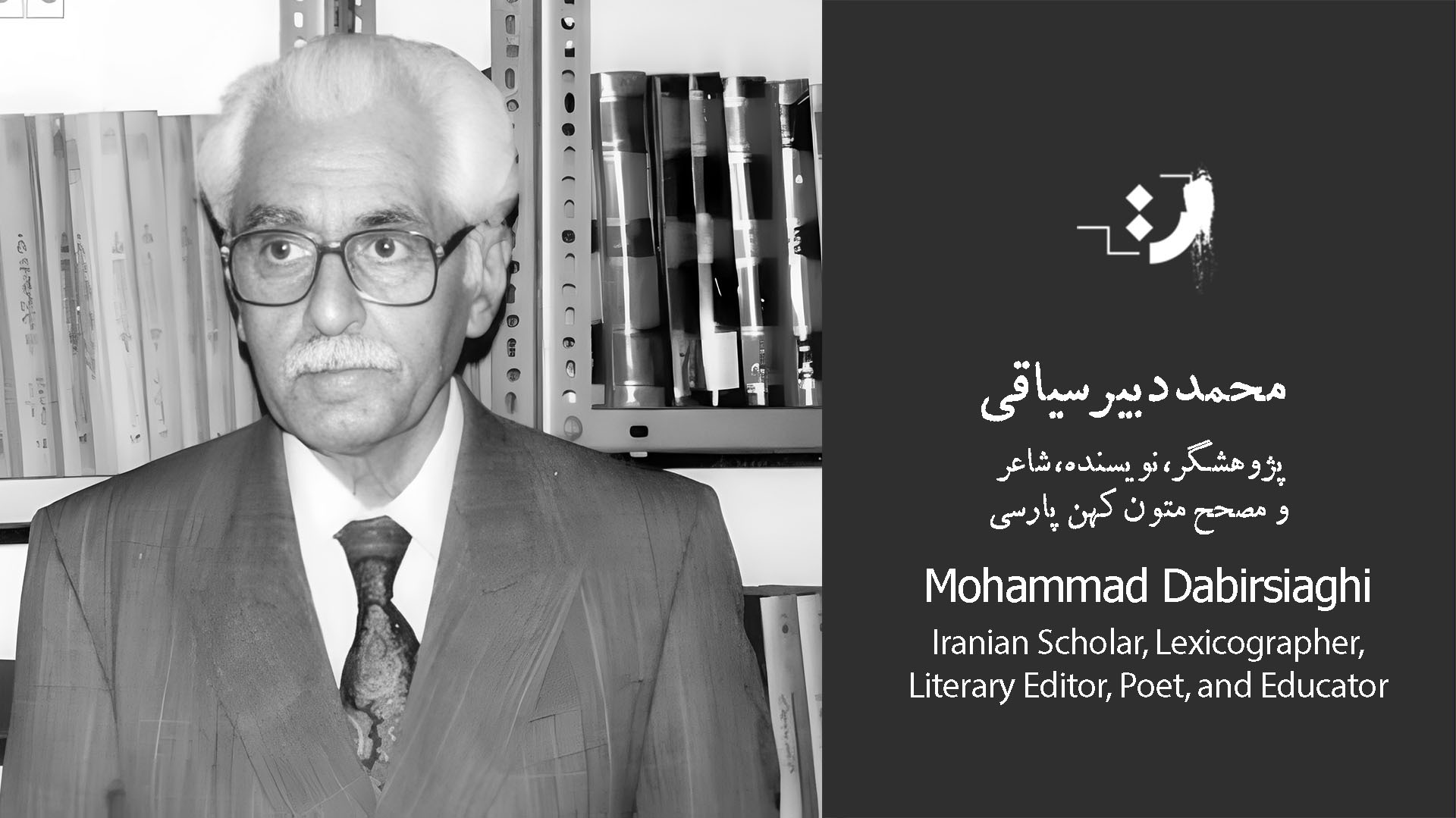Mohammad Dabirsiaghi

Biography
Mohammad Dabir-Siaqi (1919 – 2018)
Iranian Scholar, Lexicographer, Literary Editor, Poet, and Educator
Early Life and Education
Mohammad Dabir-Siaqi was born on February 23, 1919, in the Golban neighborhood of Qazvin, Iran. His father, Seyed Baqer, was a renowned calligrapher, and his mother descended from prominent clerics of the Qajar period. Dabir-Siaqi received his early education in Qazvin and completed high school at Shahpour (Omid) High School. He then earned a PhD in Persian Language and Literature from the University of Tehran in 1945. He was mentored by some of Iran’s most distinguished scholars, including Badiozzaman Forouzanfar, Malek o-Shoara Bahar, and Ahmad Bahmanyar.
Academic and Government Career
Dabir-Siaqi began his professional journey as a teacher of mathematics in Qazvin and later joined the Ministry of Finance, where he served for 34 years in various administrative and tax-related roles. In 1947, he started his collaboration with Ali Akbar Dehkhoda on the monumental Dehkhoda Dictionary, contributing to the compilation and editing of the Persian language’s most authoritative lexicon. He continued this work with Mohammad Moin and Seyed Jafar Shahidi until the project’s completion in 1980.
He was also a founding member of the Iranian Studies Association, serving as its secretary from 1946 until 1969, and held long-term affiliations with the Institute for the Compilation and Publication of Dehkhoda Dictionary, the Academy of Persian Language and Literature, and the Cultural Heritage Organization of Iran.
Contributions to Persian Literature
Mohammad Dabir-Siaqi is widely recognized as one of the foremost textual editors of Persian classical literature. Over more than 70 years, he edited, annotated, and published nearly 90 critical editions of major Persian texts, including:
Shahnameh by Ferdowsi (in several editions, including prose translations and annotated volumes)
Divan of Manuchehri Damghani
Nuzhat al-Qulub by Hamdollah Mostowfi
Safarnama by Naser Khosrow
Divan of Farrokhi Sistani
Divan of Anvari, Divan of Daqiqi, and Divan of Unsuri
Lughat-e-Fors by Asadi Tusi
Tazkireh al-Moluk, Majma‘ al-Fors, and many other historical and literary works
He also authored and compiled a Persian dictionary, which aimed to update and expand upon the Dehkhoda Dictionary using modern texts and vocabulary, some of which was published after 1980.
Teaching and International Work
Dabir-Siaqi taught Persian grammar and classical literature at several prominent universities in Iran, including the University of Tehran, Shahid Beheshti University, and the Imam Khomeini International University in Qazvin. He also held academic positions abroad, lecturing at Beijing University in China and Ain Shams University in Cairo, Egypt.
His lectures and research reached international audiences, including appearances at universities in Germany, India, and the United States. He also contributed scholarly entries to encyclopedias such as the Encyclopaedia Iranica and the Islamic Encyclopaedia of Iran.
Cultural Legacy and Honors
Dabir-Siaqi’s work earned him widespread recognition. In 1991, he received the Mofid Foundation Award for his lifetime contributions to Persian scholarship. His legacy is commemorated in numerous ways:
A bronze bust of him was unveiled at the National Library and Archives of Qazvin.
A public library in the city of Mohammadieh (near Qazvin) bears his name, established with funds from the sale of his personal home in Tehran in 1994.
The journal Bukhara dedicated a special issue (No. 117) to his life and contributions.
In 2016, a documentary film about his life, titled Nadereh-Kar (“The Rare Worker”), was released by filmmaker Manouchehr Mishiri.
Philosophy and Influence
A devout student of Persian literary tradition, Dabir-Siaqi believed that scholars owe a moral debt to their cultural heritage. He frequently referred to his editorial work on the Shahnameh as his way of “repaying a debt” to Ferdowsi. His method combined rigorous philology with accessible prose translations and thoughtful glossaries, making classical texts more available to students and general readers.
Death
Mohammad Dabir-Siaqi passed away on October 8, 2018, in Qazvin, at 99. He was buried in Behesht Hosseini Cemetery, Qazvin. His passing marked the end of an era in Persian literary scholarship.
- Birthday: 24 February 1920
- Death: 8 October 2018
- Birthplace: Qazvin, Qazvin, Iran
Iranian Scholar, Lexicographer, Literary Editor, Poet, and Educator
